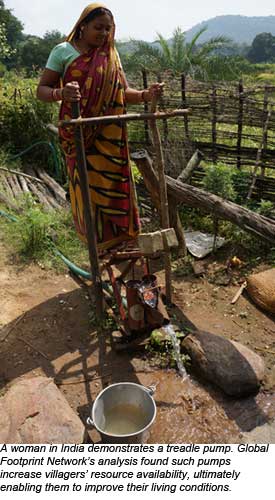India Villages Use HDI and Footprint to Achieve Multiple Goals
Just as the Sustainable Development Goals are setting targets for national governments around the world, many development organizations seek metrics to measure their sustainable development achievements.
One such organization is IDE-India (IDEI), a nonprofit that works to eradicate poverty with small-holder farming communities.
This year, IDEI and Global Footprint Network piloted a tool that measures the Human Development Index (HDI) and Ecological Footprint of villages in Odisha, India. By calculating HDI and Ecological Footprint for several villages where IDEI has projects, we can show a snapshot of each community’s development and natural resource conditions.
 Though it is still early in the application of the tool, preliminary results indicate that IDEI treadle pumps — human-powered water pumps that provide additional irrigation water during dry seasons — increase income (a component of HDI) and biocapacity (biologically productive land surface) … but also increase the Ecological Footprint, though only marginally.
Though it is still early in the application of the tool, preliminary results indicate that IDEI treadle pumps — human-powered water pumps that provide additional irrigation water during dry seasons — increase income (a component of HDI) and biocapacity (biologically productive land surface) … but also increase the Ecological Footprint, though only marginally.
In other words, the pumps increased the villagers’ resource availability, ultimately enabling them to improve their living conditions.
The villagers use the information about their HDI and Footprint in a different way — by taking the knowledge they gain from workshops on natural resources to construct an image of their ideal village.
In time, and by conducting pre- and post-assessments, we hope to demonstrate that sustainable development is more effective than conventional development in securing human well-being. With these tools we hope to inspire other communities and social entrepreneurs around the world to adopt a similar approach.
This article was adapted with permission from the Global Footprint Network. View the article in its entirety here.
Goal 1/Goal 2/Goal 3/Goal 6/Goal 8/Goal 12/Goal 15

No comments